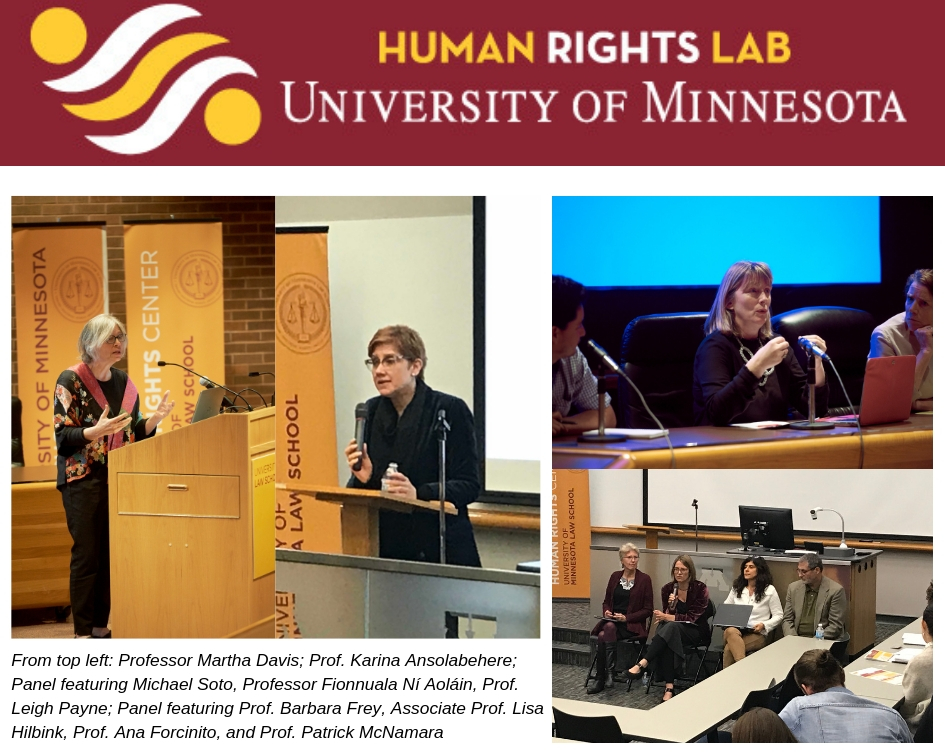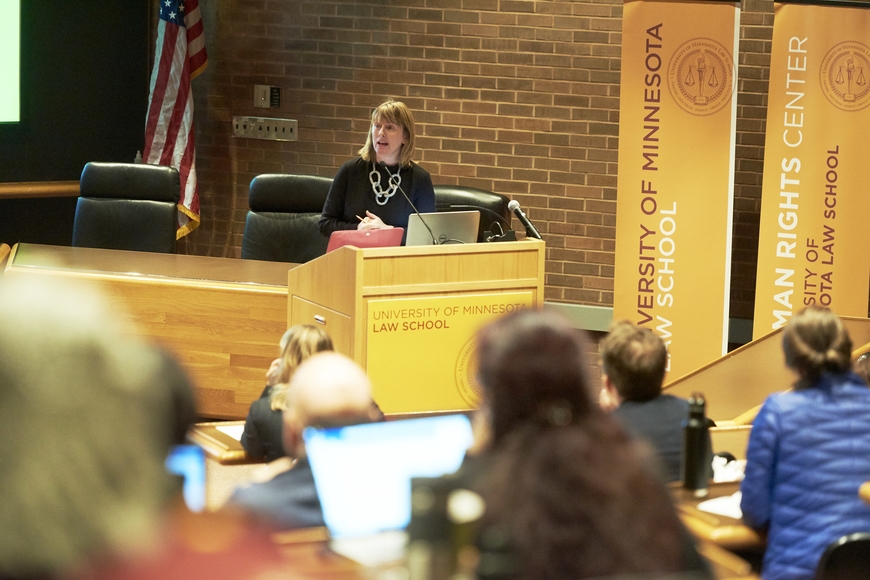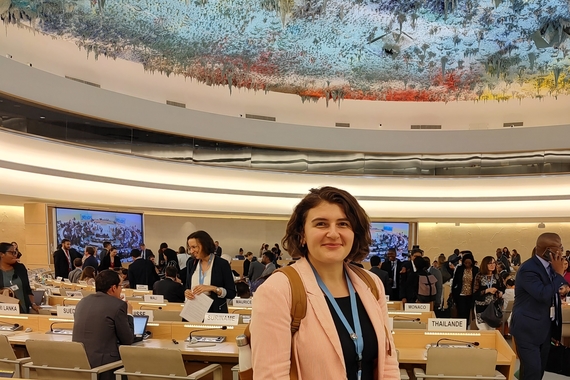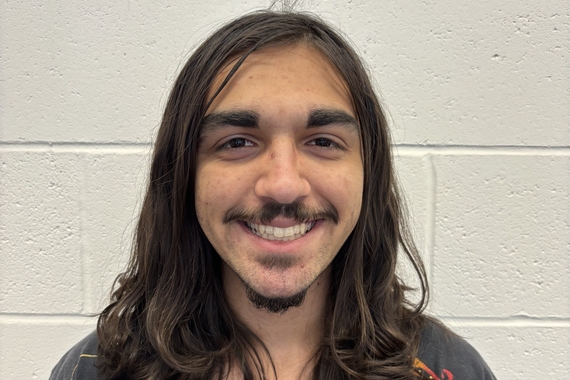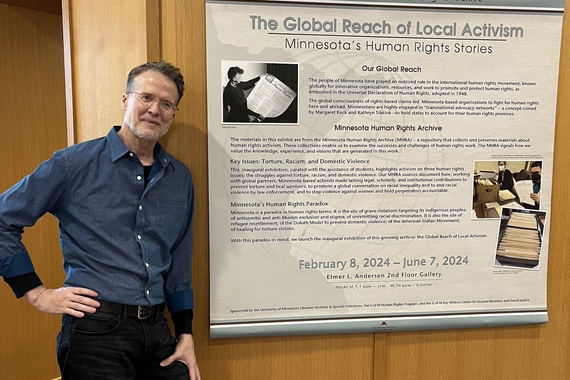The 2018 Human Rights Lab Conference Leverages Multiple Disciplines to Examine What it Means to “Institutionalize Accountability” in the World of Human Rights
What is the Grand Challenges Funded Human Rights Lab?
This fall, faculty and graduate students shared the findings from their research at the Human Rights Lab Conference. Funded by the University’s Grand Challenges initiative, the Lab facilitates interdisciplinary knowledge production targeted at improving human rights, and building the capacity of human rights defenders around the world. The Lab supports graduate students working with graduate students working with faculty. The Lab’s work revolves around four main objectives:
-
“strengthen existing faculty work and leadership in research intended to advance human rights;
-
expand the experiential, intercultural, and interdisciplinary aspects of the training of our human rights students;
-
reduce inequalities by making meaningful contributions with partners that are on the frontlines of promoting the rights of marginalized groups in contexts of severe power disparities; and
-
build our lasting capacity as a nationally and internationally recognized ‘Human Rights University.’”
The theme of this first Lab conference was “Institutionalizing Accountability.” According to the organizers, “While the Human Rights Lab has supported conceptually and geographically diverse endeavors, accountability gaps–including regulatory, institutional, social, and cultural–have been a consistent theme across all of the lab projects.” Because of this, the inaugural conference addressed the central role that accountability plays in enabling and advancing human rights protection.
Methodological Approaches to Accountability
The opening panel of the conference highlighted the different methods used by faculty to understand and explain accountability in human rights situations. Human Rights Program Director Barbara Frey presented some of the work of the interdisciplinary “Observatory on Disappearances and Impunity in Mexico Database,” Frey explained how press coverage on disappearances tended to reproduce government narratives that criminalized the victims. Weak reporting practices minimize the seriousness of the problem and fail to address the failures of the government to investigate and solve cases.
Professor Ana Forcinito, from the Department of Spanish and Portuguese Studies, discussed the process of preserving evidence regarding accountability through electronic means. Forcinito and graduate student, Carolina Anon’s work constructed a public website that contains the videotaped presentations and interviews from the Human Rights Program’s 2017 conference, “Truth, Trials, and Memory: An Accounting of Transitional Justice in El Salvador and Guatemala.” The conference addressed the violent human rights abuses that took place in these two countries, while also highlighting the truth commissions and the ways in which these countries pursued justice.
Lisa Hilbink, Professor of Political Science, presented her research on access to justice in Chile and the different levels of understanding and trust that the public has in the justice system. Her findings concluded that improving legal systems did not necessarily translate to quality individual experiences in the judicial systems. Also, through the formation of focus groups, Professor HIlbink found that income and gender were factors in determining how much trust and follow through one would invest in the justice system.
Patrick McNamara, History Professor, discussed his research on disappearances in El Salvador this past summer, using stories, statistics, and solutions. He shared personal stories of those he worked with in El Salvador, as well as statistics, pointing out that 240 people per 100,000 are disappeared in El Salvador, much higher than other countries in the world. Professor McNamara’s presentation showed the importance of narrative and emotion in promoting accountability.
Professor Karina Ansolabehere, research professor from the Institute of Juridical Research at the National University of México (UNAM), gave the keynote presentation, addressing the question “Is human rights institutionalization desirable?” When responding to a question regarding the “dark” side of human rights institutionalization, Professor Ansolabehere pointed out that it can be difficult to institutionalize human rights especially when there is a lack of resources. She also highlighted that many times, there is a better enjoyment of rights when they move beyond law and legal systems and permeate into public policy and everyday life. This is not to overlook, however, Professor Ansolabeher’s message that human rights can be furthered in a positive way through institutions and legal systems, because courts DO have the power to implement accountability and transitional justice. And when courts choose to uphold human rights, they create a norm of doing so.
While this complex question can often seem too daunting to confront, Ansolabehere made it clear that those working within this field are aware of the complications but nevertheless, willing to find solutions. Drawing on her differentiation of a cynic versus a skeptic, the former being “doubtful without hope,” and the latter “doubtful with hope,” she left the group with these words: "We are skeptical-we are dreamers too.”
Accountability Models for Difficult Times
Northeastern University professor Martha Davis launched Friday’s conference sessions, speaking on “Human Rights Accountability: Learning from ‘Small Places.’” Professor Davis argued that in some cases, using traditional human rights concepts of accountability (addressing past violations through transitional justice and encouraging future human rights compliance) are limiting. She noted that there are ongoing structural problems human rights accountability mechanisms face, and human rights advocates and practitioners should bolster their accountability strategy toolkit by engaging with the local. How can this be done? Luckily, Professor Davis cited some examples of rich opportunities to broaden the human rights accountability scope. She suggested engaging with actors beyond government and thinking more innovatively about partners. She emphasized that interdisciplinary approaches are necessary, which demonstrates the importance of forums like the Human Rights Lab. Specifically she cited new movements in music, art, psychology, and forensic sciences to incorporate human rights into their own work.
